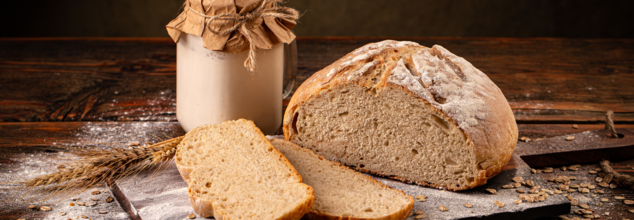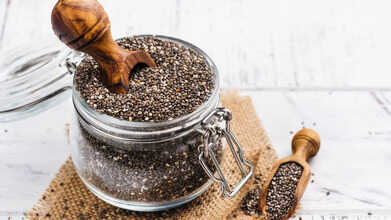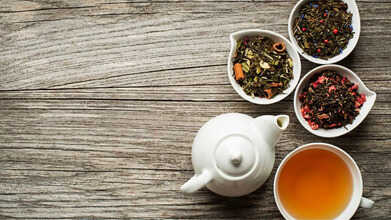- Health Conditions A-Z
- Health & Wellness
- Nutrition
- Fitness
- Health News
- Ayurveda
- Videos
- Medicine A-Z
- Parenting
- Web Stories
Can Sourdough Bread Help You Sleep Better?

Sourdough Bread and Sleep (Credit-Canva)
Sleeping is a fundamental human need, but still, a huge portion of the population struggles to get sufficient restful sleep. There are many reasons as to why that is the case, some people knowingly push their bodies to stay awake, while others may suffer with some illness making it difficult for them to sleep. According to the American Psychiatric Association, sleep disorders affect more than 50 million individuals in the United States alone. Those who routinely experience restless nights understand the frustration and impact of it on daily life. As such, the search for natural sleep remedies is a common pursuit. Surprisingly, a simple staple like sourdough bread may offer unexpected benefits for promoting better sleep quality.
The connection between your gut health and sleep quality has been recognized more and more by researchers. According to them, a healthy gut microbiome is a place where the complex community of microorganisms live inside the digestive tract and that plays a crucial role in overall well-being. While it does play a huge role here, you will see how it also plays important roles in other bodily functions such as sleep. This connection has also been called the gut-brain axis, which is the bidirectional communication or in simple language a 2-way communication between your gut and the central nervous system. A 2022 review published in Sleep Medicine Reviews helped us understand this relationship better and showed how disruptions in sleep patterns can negatively impact the gut microbiome, and conversely, imbalances in gut health can contribute to sleep disturbances. Basically, if your gut isn’t happy with your nutritional choices, your sleep is also not going to be restful or good. This research underscores the importance of maintaining a healthy gut for optimal sleep.
Prepping Your Gut for Rest
Several studies have researched the impact of gut health on sleep quality. A 2019 study published in PLoS One looked into whether diverse gut microbiomes could improve sleep quality for people. The researchers discovered that providing the gut with supportive nutrients had a good influence on sleep health. Sourdough bread stands out from other breads because of its nutrient profile and how it is made. While other breads need commercial yeast, sourdough is made with wild yeast starter, which has to undergo a fermentation process, social media has made this process well recognized as many people make sourdough starters and show the process of fermentation. This fermentation is key to sourdough's gut-friendly properties, as explained by WebMD. Healthcare professionals emphasized the importance of fermentation, explaining that it creates prebiotics, which serve as food for the beneficial bacteria in the gut. These prebiotics found in sourdough can support a healthy gut microbiome, which, as previously discussed, can positively impact sleep. Sourdough bread is also a low-glycemic-index food, as confirmed by a 2021 study in Foods. Low-glycemic foods are digested more slowly, minimizing the burden on the body's sugar processing and potentially improving sleep.
Impact of Sugar on Sleep
A 2019 study in the American Journal of Lifestyle Medicine found that college students, who on top of their already time and energy-consuming courses, consumed high amounts of added sugars often had poorer sleep quality. Similarly, a 2019 study in the American Journal of Clinical Nutrition found that postmenopausal women with high-glycemic index diets had a higher risk of insomnia. While a single slice of sourdough bread won't magically fix sleep problems, it can be a very important addition to a balanced diet. Combined this with other sleep-promoting foods and lifestyle habits and you will see how sourdough bread's gut-friendly and blood sugar-regulating properties may contribute to better sleep.
8 Cups Of This Drink Can Help Increase Your Longevity But More Than That Could Increase Your Risk Of Heart Diseases

(Credit-Canva)
One of the major point of conversations right now is longevity. People are learning day by day about what may affect their biological age and how, why and which way they can lower it. Many studies have pointed out that things like sugar, and some drinks may lower it, however, a new study shows that there may be some unexpected heroes among our daily drink consumption.
A study recently published in the British Journal of Nutrition showed something interesting: drinking about seven to eight cups of tea, coffee, and plain water every day might help you live longer.
Researchers looked at the drinking habits of over 182,000 people and found that hitting this total number of drinks, when balanced well, offered the best protection. It lowered the risk of dying from all kinds of serious problems, including cancer and heart disease. The main finding is that the mix of drinks is key—it's not good to overdo it, as too much might actually be bad for your heart.
How Do Tea, Coffee Or Water Help Your Health?
The research figured out the best possible way to combine these drinks to get the most health benefit:
Optimal Daily Total
The number one rule is to drink a total of seven to eight beverages every day. This total includes your water, coffee, and tea.
Coffee and Tea Ratio
Once you're hitting that daily goal, the best way to mix the coffee and tea is in a 2:3 ratio. This means for every two cups of coffee, you should have three cups of tea. This specific blend was found to be the most powerful for protecting you against dying from heart problems, cancer, and diseases of the lungs and stomach.
Hydration
The experts stress that the most important thing is to just stay hydrated first. Get your total number of drinks up to seven or eight. After you've done that, then you can start swapping some of your water for the healthier mix of coffee and tea.
How Much Tea Or Coffee Should You Drink?
The study also came with important warnings about drinking too much or too little of the mix:
If You Drink Very Little: If you currently have less than four total drinks a day, just adding a cup of coffee or tea won't help much. You need to focus on drinking more water first to reach the main goal of being fully hydrated.
If You Drink Too Much: If you are drinking nine or more cups of fluid a day, replacing water with more tea or coffee could actually raise your risk of dying from heart disease. More is not always better! Finally, the scientists noted two important things:
They can only say there's a link (an observation) between the drinks and living longer; they can't say for sure that the drinks are the direct cause of longer life. The study didn't know how people prepared their drinks—whether they added a lot of sugar or milk, which could affect the health benefits. The main takeaway is to focus on getting your overall daily fluid intake to seven to eight drinks and then use the beneficial mix of coffee and tea wisely.
Is It Safe to Eat Chia Seeds During Pregnancy? Expert Explains

Credits: Canva
Pregnancy is a unique and exciting journey, full of changes, decisions, and the constant desire to give your baby the best start in life. Nutrition becomes particularly important during this time, as what a mother eats can impact both her own health and the development of her baby. One ingredient that has been gaining popularity among expectant mothers is chia seeds.
Though tiny, these seeds are packed with nutrients and can be a versatile addition to a pregnancy diet. To understand their benefits, we spoke with Dr. Deepa, Senior Consultant at Yashoda Super Speciality Hospital Kaushambi, who shared how chia seeds can support maternal and fetal health.
Benefits of Chia Seeds for Pregnant Women
Chia seeds are simple to incorporate into daily meals as you can sprinkle them on oatmeal, mix them into yogurt, blend them into smoothies, or even add them to baked goods.
Their mild taste and texture make them easy to enjoy, which is one reason why many pregnant women are turning to these seeds. According to Dr. Deepa, there are several ways chia seeds can help during pregnancy:
Supports Digestion
Constipation and other digestive issues are common during pregnancy due to hormonal changes and slower digestion. Chia seeds are high in soluble fibre, which can help regulate bowel movements. When soaked in liquid, they expand into a gel-like texture that aids digestion and promotes a feeling of fullness. This not only helps prevent overeating but also supports healthy weight gain, which is important for both mother and baby.
Helps Maintain Blood Sugar Levels
Fluctuating blood sugar levels can be a concern for expectant mothers, sometimes leading to gestational diabetes. The fibre in chia seeds slows sugar absorption into the bloodstream, helping to maintain stable blood sugar and energy levels. By including chia seeds in meals, pregnant women may reduce the risk of sudden sugar spikes and maintain steadier energy throughout the day.
Aids Hydration
Hydration is essential during pregnancy, and chia seeds can play a supportive role. Dr. Deepa points out that chia seeds are versatile and can be added to a wide variety of dishes, from smoothies and salads to yogurt or baked recipes. When mixed with water or other liquids, they absorb moisture, helping to keep the body hydrated and supporting overall wellness.
Nutritional Power for Mother and Baby
Although small, chia seeds are a nutritional powerhouse. They are rich in omega-3 fatty acids, fibre, protein, calcium, and antioxidants. These nutrients support brain development in the fetus, improve digestion, help maintain healthy blood sugar levels, and contribute to overall maternal health.
Dr. Deepa recommends consuming chia seeds in moderation. Eating too many may cause digestive discomfort due to their high fibre content. A typical portion is about one to two tablespoons per day. She also emphasizes that pregnant women should consult their healthcare provider before making significant dietary changes, especially if they have pre-existing medical conditions.
Including chia seeds as part of a balanced, varied diet can help pregnant women feel nourished, support digestion and hydration, and provide essential nutrients for their growing baby. With their versatility and health benefits, chia seeds are a convenient and powerful addition to a pregnancy-friendly diet.
Is Tea First Thing In The Morning Bad For Digestion? What Doctors Say

Credits: Canva
Are you one of those people who can’t start their day without a cup of tea? In many Indian households, tea is the first aroma that fills the morning air. But is having tea on an empty stomach really safe? To clear this common doubt, we spoke to Ms. Dnyeshwari Barve from the Nutrition and Dietetics Department at DPU Super Specialty Hospital, Pimpri, Pune. She explained how morning tea can affect your digestion and what you can do to enjoy it safely.
Morning Tea on an Empty Stomach: Is It Really Bad for Digestion?
‘Bed tea’ refers to sipping tea right after waking up, even before breakfast. While it may feel comforting and refreshing, experts warn it can also upset your stomach. After a long overnight gap of 7–8 hours without food, your digestive system is more sensitive. Drinking tea during this time can overstimulate the gut, trigger excessive bowel movements, and lead to hyperacidity.
However, it’s not all bad news. Barve points out that tea does contain antioxidants and anti-inflammatory compounds, and some varieties like green or black tea may even support immunity when consumed correctly. The problem often lies in preparation, boiling tea with milk and sugar can damage healthy gut bacteria. Choosing lighter versions and pairing them with the right foods can make a big difference.
How Morning Tea Affects Your Gut
Ms. Dnyeshwari Barve told us a few ways your morning tea can affect your gut:
- Increased Acidity and Irritation: Tea contains caffeine and tannins, which boost stomach acid. On an empty stomach, this can irritate the stomach lining, causing bloating, cramps, and heartburn.
- Inflammation Risk: Regular empty-stomach tea may inflame the stomach lining and contribute to chronic issues like gastritis.
- Dehydration: Tea has a diuretic effect, which means it increases urination. After a night of fasting, this can worsen dehydration and even constipation.
- Gut Bacteria Imbalance: Large amounts of tea, especially with milk, may disrupt the balance of good bacteria in your gut, affecting digestion and metabolism.
- Nutrient Absorption Interference: The tannins in tea can reduce the absorption of minerals like iron from food, especially if consumed frequently on an empty stomach.
How to Have Morning Tea Safely
Barve doesn’t recommend cutting tea out altogether. Instead, she suggests simple changes:
- Have a light snack, like soaked almonds, a banana, or a slice of toast—before your tea to protect the stomach lining.
- Choose herbal teas such as chamomile or ginger, which have natural anti-inflammatory properties and are easier on digestion.
- Limit milk and sugar, which can worsen acidity and harm gut bacteria.
- Stay hydrated with water before reaching for your first cup.
Morning tea isn’t entirely bad, but having it on an empty stomach every day can cause digestive issues in the long run. The key is moderation and mindful pairing with food. If you enjoy your bed tea, make small adjustments so your morning ritual supports your gut health rather than harming it.
© 2024 Bennett, Coleman & Company Limited

